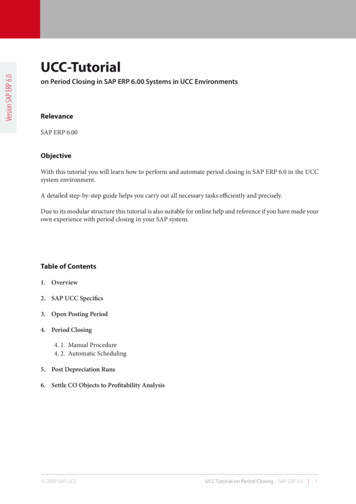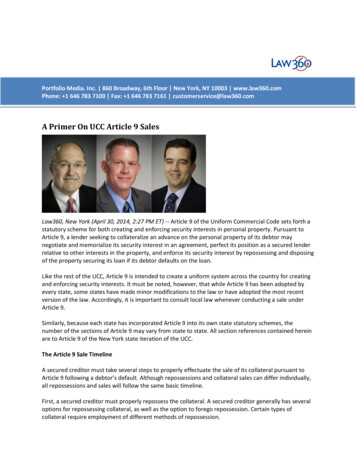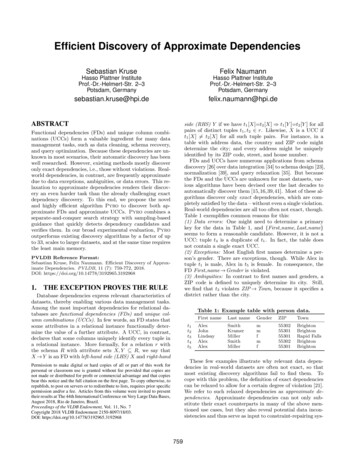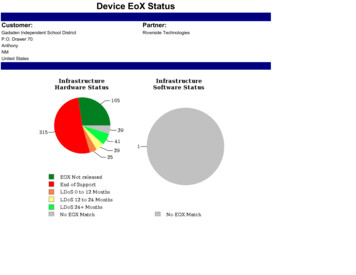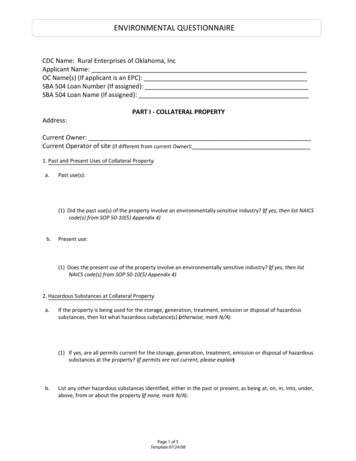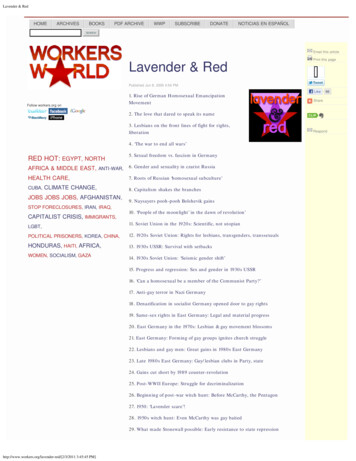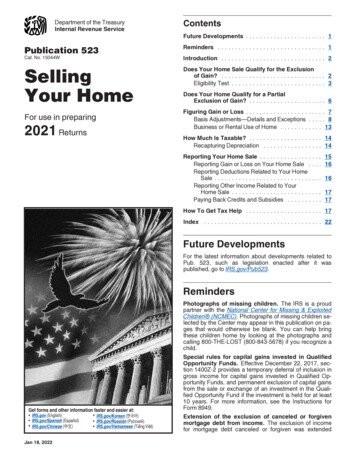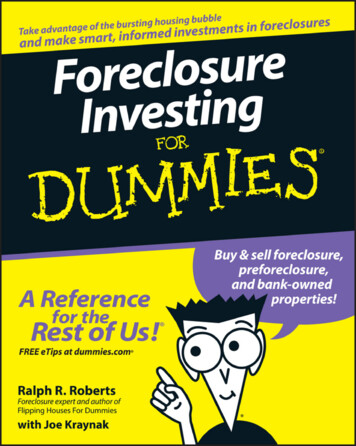
Transcription
Presenting a live 90-minute webinar with interactive Q&AUCC Foreclosures on Collateral: Effectuating aSale and Evaluating Article 9 AlternativesProtecting Creditor and Borrower Interests and Overcoming Obstacles to the SaleMONDAY, NOVEMBER 17, 20141pm Eastern 12pm Central 11am Mountain 10am PacificToday’s faculty features:Peter S. Burke, Partner, Paul Hastings, Los AngelesTheodore A. Cohen, Special Counsel, Sheppard Mullin Richter & Hampton, Los AngelesJennifer B. Hildebrandt, Of Counsel, Corporate Department, Paul Hastings, Los AngelesThe audio portion of the conference may be accessed via the telephone or by using your computer'sspeakers. Please refer to the instructions emailed to registrants for additional information. If youhave any questions, please contact Customer Service at 1-800-926-7926 ext. 10.
FOR LIVE EVENT ONLYSound QualityIf you are listening via your computer speakers, please note that the qualityof your sound will vary depending on the speed and quality of your internetconnection.If the sound quality is not satisfactory, you may listen via the phone: dial1-866-370-2805 and enter your PIN when prompted. Otherwise, pleasesend us a chat or e-mail sound@straffordpub.com immediately so we can addressthe problem.If you dialed in and have any difficulties during the call, press *0 for assistance.Viewing QualityTo maximize your screen, press the F11 key on your keyboard. To exit full screen,press the F11 key again.
FOR LIVE EVENT ONLYFor CLE purposes, please let us know how many people are listening at yourlocation by completing each of the following steps: In the chat box, type (1) your company name and (2) the number ofattendees at your location Click the word balloon button to send
MECHANISMS FOR DISPOSING OF DISTRESSEDASSETS: A COMPARISON OF UCC FORECLOSURES,BANKRUPTCY SALES, ASSIGNMENTS FOR THEBENEFIT OF CREDITORS, AND RECEIVERSHIPSTheodore A. CohenSheppard, Mullin, Richter & Hampton LLPNovember 17, 2014tcohen@sheppardmullin.com(213) 617-4237www.sheppardmullin.com Sheppard, Mullin, Richter & Hampton LLP 2014
Issues For Secured Party, Debtorand Buyer Risks to Secured Party – tax, employeeobligations, lender liability, etc. Speed to Close – to preserve enterprise value Sale "Free and Clear” No Representations and Warranties Successor Liability Cost Lease and Contract Assumption Employee Issues Fiduciary Duties of Debtor's Board Which Vehicle/Mechanism to Use5
Different Constituencies/Different Interests Debtor/Management/Board– Maximize price– Minimize liability for breach of fiduciary duty claims arising out ofdecisions made while the company is insolvent or in the zone ofinsolvency– Avoid liability under guaranties– Avoid tax liability Buyer––––––Minimize price paid and transaction costsMinimize successor liabilityAvoid competitive biddingAccess to management and documents for due diligenceClose sale quicklyAcquire assets free and clear6
Different Constituencies/Different Interests Secured Party––––Maximize priceGet out quickly – get bad loan off the booksAvoid liability for Debtor’s employee and tax obligationsMinimize the risk of being accused of not acting in acommercially reasonable manner– Avoid lender liability for “controlling” the Debtor– Don’t “throw good money after bad” – sometimes a loan just hasto be written off7
UCC Sale Basics–––––––––Need secured party with perfected security interest to cooperateDebtor must be in default – 9-601(a)No judicial proceedings requiredSecured party forecloses lien and sells assets through agreement (Billof Sale, Foreclosure Sale Agreement)Title, but not possession, transferred – implications on consent ofDebtorSale free and clear of foreclosing & junior liens, not senior liens – 9617(a)Typically lower transactions costs than alternativesContracts and leases cannot be assumed and assignedPrivate vs. public sale8
UCC Sale Private Sales– Specified buyer; no auction or overbid process– Secured Party may not bid at private sale limited exception essentially for publicly tradedsecurities – 9-610(c)(2)– Notice requirements: contents – 9-611(c)safe harbor notice – 9-613time required – 10 days – 9-612(b)25 days for federal tax liens – 26 U.S.C. § 7425(c)(1)check statutes for state tax lien notice requirementsreview UCC search– No disclosure of identity of buyer or terms of sale– No risk to buyer of being outbid9
UCC Sale Public Sales– Auction or other competitive bidding through licensed thirdparty auctioneer or investment banker– Formal marketing process– Secured party may credit bid – 9-610(c)(1)– Notice requirements – same as private sale– Safe harbor for public sales notice – 9-613– To satisfy “commercial reasonableness,” should publish aswell – 2 places– Also notify potential purchasers– Allow inspection– Public disclosure to notice parties and auction attendees– Risk of a buyer being outbid10
UCC Sale Commercial Reasonableness– All sales must be commercially reasonable – 9-610(b)– Definition not practical – 9-627(b)(3): “in conformity with reasonable commercial practices among dealers in thetype of property that was the subject of the disposition”– Price obtained is not dispositive – 9-627(a)– Commercial reasonableness important to deficiency, but also inminimizing fraudulent transfer and successor liability risks Good idea for secured party to try to maximize valueCast a wide net for notice of public saleGet evidence of valueMarket the collateral (have debtor do it) Additional Steps for Mitigating Risk of FraudulentTransfer and Successor Liability– Undersecured secured party example– Don’t sell to an insider; and if you do, do public sale– No “Clear Channel” risk in UCC sale11
UCC Sale Additional Risks– Involuntary Bankruptcy– Voluntary Bankruptcy or Injunctive Relief Where cooperation of Debtor for transfer of possession notnecessary because collateral is intangible– No Court order– No third party exercising independent judgment fortransaction– Challenges raised after the fact Conclusion on UCC Sales– Viable option to transfer assets as going concern– Benefits and drawbacks– Under right circumstances, UCC Sale iscomparatively inexpensive, efficient and quick12
363 Sale How it works– Debtor files bankruptcy, typically Chapter 11– Debtor brings motion to approve bid procedures andsell under Bankruptcy Code Section 363– Court typically holds two hearings – bid procedurehearing and sale hearing– Stalking horse bidder and an opportunity to overbidthrough auction process– Court issues sale order13
363 Sale Pros– Because Court approval is required and results in a sale order, objections andchallenges raised before closing – by the time buyer closes, buyer and securedparty have comfort level– Sale free and clear of liens, claims, encumbrances Exception for junior liens not paid in full from sales proceeds – Clear Channel v.Knupfer (In Re PW, LLC), 391 B.R. 25 (9th Cir BAP 2008) Distinguishing Clear Channel – e.g., In Re Boston Generating, 440 B.R. 302, 333(Bankr. SDNY 2010) (foreclosure actions under state law satisfy 363(f)(5)); In Re Jolan,Inc., 403 B.R. 866 (Bankr. W.D. Wash 2009) (state legal and equitable proceedingsexist where junior lienholder can be compelled to accept money satisfaction); In reNAMCO Capital Group, Inc. (Bankr. C.D. Cal. 2011, Case No. CV 10-0766-GAF)(unpublished) (notwithstanding Clear Channel, 363(m) renders moot free and clear saleorder under 363(f)); In Re Nashville Senior Living, LLC, 407 B.R. 222 (9th Cir. BAP2009) (same). Title insurance– Risk of successor liability virtually eliminated, but order may be overridden bycertain liabilities – e.g., environmental– With some exceptions (e.g., personal service and certain IP contracts), contractsand leases can be assumed and assigned over objections of third parties– Debtor’s management protected from breach of fiduciary duty claims by order– Cap on lease rejection damages– No risk of secured party not acting in commercially reasonable manner14
363 Sale Cons– Expensive – administrative costs and buyer, secured party, orboth often have to contribute– Creditors Committee may have to be "compensated"– Slowest – 45-60 or more days (but Arizona case - 21 days frompetition date to date of auction/sale hearing – helped thatpurchase price doubled from stalking horse bid)– Risk of being outbid– Every term of sale is public record– Loss of control to the bankruptcy court15
Assignment for the Benefit of Creditors How it works– Debtor assigns all of its assets to a third partyassignee– Third party assignee liquidates assets forDebtor’s creditors– Proceeds of liquidation are distributed accordingto priority– Assignee may be able to pursue preferences– ABCs commonly used to effectuate distressedasset sales– Because ABC and sale occur without courtinvolvement and notice, any challenges are madepost-closing16
Assignment for the Benefit of Creditors Pros– Faster than 363 Sale – as soon as 1-10 days afterassignment– Cheaper than 363 Sale– In California, Assignee can occupy leased premisesfor up to 90 days following the assignment by payingrent at the lease rate, even if the lease allows thelessor to evict the lessee upon making an assignmentfor the benefit of creditors (Cal. Civ. Code § 1954.1)– Best when secured party is vastly undersecured andcooperative– Assignee might not require marketing and auction (ifvaluation and pre-assignment marketing)– Can be done in conjunction with UCC Sale to wipeout junior liens17
Assignment for the Benefit of Creditors Cons– Less protection from successor liability– Assets cannot be sold free and clear of liens without consent oflienholders, including secured party (exception for combinedUCC Sale)– Buyer closes before knowing whether there will be challenges tosale– Contracts and leases cannot be assumed without consent ofthird parties– Board can be accused of making ABC breach of fiduciary duty(mitigate risk by D&O policy)– Involuntary Bankruptcy risk– May not be available if Debtor is in multiple states18
Equity Receivership How it works– Typically, secured party files lawsuit seekingappointment of receiver - Court appoints neutral thirdparty as receiver– Receiver’s duties are subject to statute and courtorder – can include operating the business, sellingproperty– Receivers can be appointed in federal or state court– Receiver must account to the Court19
Receivership Pros– Receiver is appointed at instance of secured party; helpful if Debtorconsents– Receivership allows business to operate to preserve enterprisevalue– Successor liability risk is reduced– Neutral court-appointed officer makes decisions, which protectssecured party and Debtor– In California, receiver can sell personal property (California Code ofCivil Procedure §568.5)– In California, secured party can credit bid (California Code of CivilProcedure §701.590(b))– In California, liens junior to secured party and all state tax liens(irrespective of priority) may be extinguished upon sale (CaliforniaCode of Civil Procedure §701.630) [does 701.630 apply toreceivership sales under 568.5?]– Unlike ABCs, national remedy under federal receiverships20
Receivership Cons– Same cons as 363 sale – expensive, slow, risk of being outbid,terms of sale public record, loss of control to court and receiver– Operational issues – receiver may not be able to operate Debtorefficiently– Cannot force non-Debtor parties to assume contracts– Secured party (or another creditor) must be willing to seekappointment of receiver– Involuntary Bankruptcy risk21
Control Under Each Vehicle/Mechanism 363– Debtor determines whether to file bankruptcy– Parties have less control because Court must approveeverything– Creditors Committee and US Trustee can weigh in– Management maintains operational control in Chapter 11 so longas no Chapter 11 trustee is appointed ABC– Debtor determines whether to make ABC– Secured party’s consent is required because assignee cannotsell assets free and clear of secured party’s lien without securedparty’s consent– Once ABC is made, control shifts to assignee– No Court oversight, so parties can act without risk of Courtdisapproval before the fact22
Control Under Each Vehicle/Mechanism Receivership– Secured party (or even unsecured creditors) can seek theappointment of a receiver– Having the consent and cooperation of the Debtor is helpful, butnot required– Parties have less control because receiver maintains operationalcontrol and the court must approve everything UCC Sale– Secured party determines whether to foreclose– Cooperation of Debtor practically (though not legally) required ifDebtor is in possession of its tangible assets; otherwise, securedparty and/or buyer must seek judicial relief since parties cannotexercise self help if doing so will breach the peace– No Court oversight, so parties can act without risk of Courtdisapproval before the fact23
[Comparison Grid]24
[Comparison Grid]25
UCC Foreclosures:Protecting Creditors'and Borrowers' Interests:Peter S. Burke, Paul nifer B. Hildebrandt, Paul 3.6208www.paulhastings.com 2014 Paul Hastings LLPConfidential – not for redistribution
Overview:Article 9 Foreclosure Default– Article 9 Remedies can only proceed after a default by thedebtor.– A “default” is typically determined by the contractualagreement in place, so long as that definition is notmanifestly unreasonable.– The UCC does not define a default. Remedies– Collection. UCC §9607– Dispositions. UCC §9610– Strict Foreclosure. UCC §962027www.paulhastings.com 2014 Paul Hastings LLPConfidential – not for redistribution
Article 9 Foreclosure:General Considerations Interested Parties Notice Rights and Duties– Rights that can not be waived– Post-default Waivers Commercial Reasonableness and Failure to Comply– When Deficiency or Surplus an Issue28www.paulhastings.com 2014 Paul Hastings LLPConfidential – not for redistribution
Article 9 Foreclosure:Interested Parties Interested Parties– Debtors: Those who have a stake in the properenforcement of a security interest by virtue of their non-lienproperty interest in the collateral.– Obligors: Those who, with respect to an obligationsecured by a security interest, (1) owe payment orperformance of the obligation (2) have provided propertyother than the collateral to secure such payment orperformance or (3) are otherwise accountable for paymentor performance of the obligation.29www.paulhastings.com 2014 Paul Hastings LLPConfidential – not for redistribution
Article 9 Foreclosure:Interested Parties Interested Parties– Secondary Obligors: Those who have a stake in theproper enforcement of the security interest because either(1) they have a secondary obligation to pay the secureddebt or (2) they have a right of recourse against the debtoror another obligor with respect to an obligation secured bycollateral. Secondary Obligor under the law of suretyship. A“Guarantor” is a secondary obligor.– Secured Parties: Those who have a security interest in thecollateral.30www.paulhastings.com 2014 Paul Hastings LLPConfidential – not for redistribution
Article 9 Foreclosure:Notice Who Receives Notice– Debtors– Secondary Obligors– Other Secured Parties and Lienholders A Secured Party does not owe a duty to provide notice to:– A debtor or obligor unless the secured party knows that theperson is a debtor or obligor, knows the identity of suchperson and how to communicate with such person.– Another secured party or lien holder that has filed afinancing statement against a person unless the securedparty knows the person is a debtor and the identity of suchperson. UCC §960531www.paulhastings.com 2014 Paul Hastings LLPConfidential – not for redistribution
Article 9 Foreclosure:Rights and Duties Rights and Duties Generally– Rights that cannot be waived. UCC §9602 Collection and enforcement of collateral. UCC §9602(3)-(4) Disposition of collateral. UCC §9602(7) Secured Party’s liability for failure to comply with Article 9UCC. §9602(13)– Agreement on Standards Concerning Rights and Duties. UCC§9603 The parties may determine by agreement the standardsmeasuring the fulfillment of rights and duties, even if theycannot be waived. UCC §9603(a)– The standards must not be manifestly unreasonable.UCC §9603(a)– Post-default Waivers. UCC §9624 Notice of Disposition. UCC §9620 Redemption of Collateral. UCC §962332www.paulhastings.com 2014 Paul Hastings LLPConfidential – not for redistribution
Article 9 Foreclosure:Commercial Reasonableness Commercial Reasonableness– Commercially reasonable collection, disposition andapplication of proceeds. UCC §§ 9607(c), 9608(a)(3), 9610,9615(c) and 9627– Every aspect of a disposition must be commerciallyreasonable. UCC §9610(a)-(b) Method/Manner; Time; Place; “Other Terms”– Any collection and enforcement by a secured party mustbe commercially reasonable.– Failure to Comply may result in damages and loss orreduction of deficiency. UCC §§ 9625 and 962633www.paulhastings.com 2014 Paul Hastings LLPConfidential – not for redistribution
Article 9 Foreclosure:Commercial Reasonableness Safe Harbor (§9627(b)(c)):– Usual manner in “recognized market”– Current price in “recognized market”– Conform with reasonable commercial practices amongdealers in the particular type of collateral– Judicial approval “Recognized Market” is very narrow34www.paulhastings.com 2014 Paul Hastings LLPConfidential – not for redistribution
Article 9 Foreclosure:Commercial ReasonablenessExamples of Commercially Reasonable Sales Regions Bank v. Hyman, 2012 WL 4479080 (M.D. Fla. 2012)– Center Capital Corp. v. PRA Aviation, LLC, 2011 WL 442107 (E.D. Pa. 2011)– Secured party had a duty to conduct its disposition of aircraft in a commerciallyreasonable manner even though the debtor had abandoned the aircraft to the securedparty in connection with its assignment for the benefit of creditors. The securedparty’s disposition was commercially reasonable because it was conducted through areputable, experienced broker who sold the aircraft in a manner consistent withstandard industry practice. Specifically, the broker marketed the aircraft, obtainedoffers from various entities, rejected a low bid, and ultimately sold the aircraft for thebest offer it could get at that time. While the fair market value of the aircraft on theday it was abandoned determines whether there was a deficiency at all, i.e., whetherthe sale was commercially reasonable, the deficiency owed must be based on theactual sales price.Disposition of a plane was commercially reasonable when the secured party used areputable broker in a manner consistent with standard industry practice, aggressivelymarketed the aircraft for three months, rejected two low bids, and sold the plane forthe best offer it received.People’s United Equipment Finance Corp v. Hartmann, 447 Fed. Appx. 522(5th Cir. 2011)–Public sale of equipment at which the secured party was the only bidder wascommercially reasonable because the sale was conducted in accordance withindustry standards and various pricing resources indicated the sale price was the fairmarket value as of the date of the sale.35www.paulhastings.com 2014 Paul Hastings LLPConfidential – not for redistribution
Article 9 Foreclosure:Commercial ReasonablenessSales Not or Possibly Not Commercially Reasonable Comerica Bank v. Mann, 2013 WL 8213701 (N.D. Ga. 2013)– Despite a Cayman Islands choice-of-law clause in the security agreement covering a yacht, Floridalaw governed the liability of the guarantor because the guaranty so provided and the secured partyso agreed during the early stages of the litigation. Thus, the guarantor’s liability required analysis ofwhether the secured party complied with the Article 9 rules relating to disposition of the collateral.The secured party’s disposition of the yacht was not commercially reasonable because: the pricewas 300,000 less than the next lowest offer and 2.5 million less than the asking price; the yachtcaptain recommended against the sale; the broker did not market the yacht to European buyerseven though the yacht was geared to the European market due to its style and Europeanmanufacture, and the European yacht market was stronger; the broker failed to market the boataggressively; and the broker advertised the yacht as a bank repo. Because the secured party failedto rebut the presumption that a commercially reasonable sale would have yielded the amount of thesecured obligation, the guarantor was not liable for the deficiency. However, pursuant to a clause inthe guaranty agreement by which the guarantor promised to reimburse the secured party for thereasonable costs of preserving and liquidating the collateral, the guarantor was responsible for thedockage fees, repairs and maintenance costs, insurance premiums, and taxes incurred by thesecured party after it took possession.VFS Leasing v. Bric Constructors, LLC, 2012 WL 2499518 (Tenn.Ct. App. 2012)–Secured party was not entitled to summary judgment on the sale of dump trucks via a public onlineauction where its only evidence was an affidavit by the auction house manager stating that suchsale “typically commands fair market value and therefore a commercially reasonable price”,whereas an affidavit by the debtor’s owner indicated among other things, that she was familiar withindustry standards for the sale of construction equipment, that the auction did not comply with suchstandards and that the bidders were not permitted to inspect the equipment.36www.paulhastings.com 2014 Paul Hastings LLPConfidential – not for redistribution
Article 9 Foreclosure:Commercial Reasonableness In re MarMc Transportation, Inc., 469 B.R. 84 (Bankr. D.Wyo. 2012)– Secured party did not prove that its private sale of an airplane wascommercially reasonable even though the secured party claimed the saleprice exceeded the appraised value of the collateral because the securedparty did not provide any evidence that the sale was conducted inconformity with industry standards. In re Inofin, Inc., 512 B.R. 19 (Bankr. D. Mass. 2014)– Secured party did not conduct a commercially reasonable sale of chattelpaper because it made no reasonable efforts to market the loan portfolio, itprovided limited and conflicting notification of the sales, the auctioneermade no effort to solicit bids from individuals or entities in the industry byplacing ads in trade publications and instead merely placed ads in theBoston Herald, which resulted in insignificant interest and a single bid fromthe secured party. However, this did not render the sale void and thedebtor’s bankruptcy trustee failed to prove that any damages resulted.37www.paulhastings.com 2014 Paul Hastings LLPConfidential – not for redistribution
Article 9 Foreclosure:Failure to Comply Basic Obligations of a Secured Party– Act in good faith. UCC §§ 1203 and 9102– Proceed in commercially reasonable manner Consequences: A person aggrieved by a secured party’sfailure to comply may seek injunctive relief or recoverdamages for losses caused by non-compliance– A Secured Party may suffer from a loss or reduction ofdeficiency38www.paulhastings.com 2014 Paul Hastings LLPConfidential – not for redistribution
Article 9 Foreclosure:Failure to Comply Persons entitled to recover damages for Secured Party’snon-compliance:– Debtor Damages include losses due to the debtor’s inability toobtain alternative financing. §9625(b) No consequential, special or penal damages. UCC§1305– Obligor– Holder of security interest in or lien against the collateral39www.paulhastings.com 2014 Paul Hastings LLPConfidential – not for redistribution
Article 9 Foreclosure:Failure to Comply Minimum statutory damages of 500 for Secured Party’sfailure to comply with specified provisions in whichrecovery may be had by the debtor. These include:– Failure to comply with the duties of a Secured Party whohas control and receives an authenticated demand by thedebtor. UCC §9208– Failure to comply with the duties of a Secured Party(assignee) when an account debtor has been notified ofassignment and there is no outstanding secured obligationand the Secured Party (assignee) is not committed to incurobligations. UCC §9209– Failure to comply with the duties of a Secured Party whoreceives a request for accounting or list of collateral by thedebtor. UCC §921040www.paulhastings.com 2014 Paul Hastings LLPConfidential – not for redistribution
Article 9 Foreclosure:Failure to Comply Loss or Reduction of Deficiency– If the secured party’s compliance is placed at issue, thesecured party must prove compliance– If the secured party cannot prove compliance, thedeficiency is presumed to be eliminated. UCC§9626, cmt. 3 The secured party may rebut this presumption Dispositions vs. Acceptance in Satisfaction41www.paulhastings.com 2014 Paul Hastings LLPConfidential – not for redistribution
Article 9 Foreclosure:Failure to Comply Potential for Multiple Recoveries for a single disposition Potential that every party may be affected by noncompliance– Secured Party – lose deficiency– Second secured party – sue for losses– Debtor – sue for loss of surplus42www.paulhastings.com 2014 Paul Hastings LLPConfidential – not for redistribution
Article 9 Foreclosure:Specific Remedies Dispositions. UCC §9610– Notification. UCC §§ 9611, 9612– Content. UCC §9613– Application of Proceeds. UCC §9615– Transfers. UCC §§9617, 9619 Collection. UCC §9607– Application of Proceeds. UCC §9608 Strict Foreclosure. UCC §9620– Proposal to Accept Collateral. UCC §962143www.paulhastings.com 2014 Paul Hastings LLPConfidential – not for redistribution
Article 9 Foreclosure:Specific Remedies - Dispositions Public Dispositions. UCC §9610– Requirements for Public Sale: Meaningful opportunity for the public to competitivelybid. Meaningful opportunity access and publicity– Characteristics of a Public Disposition: Often involves a public auction An investment banker may be involved to solicit bids May involve a stalking horse bidder44www.paulhastings.com 2014 Paul Hastings LLPConfidential – not for redistribution
Article 9 Foreclosure:Specific Remedies - Dispositions Public Dispositions. UCC §9610– Access: A public disposition must take place on accessibleproperty, during normal business hours and provide ameaningful opportunity for the public to bid.– Collateral available for inspection: A public disposition shouldusually be held where the collateral is located, so that thepublic has an opportunity to inspect the collateral.45www.paulhastings.com 2014 Paul Hastings LLPConfidential – not for redistribution
Article 9 Foreclosure:Specific Remedies - Dispositions Public Dispositions UCC §9610– Publicity Notice: time, place, terms of sale, collateral Intangible Collateral:– Publicizing intangible collateral, such as membershipinterests and partnership interests, poses differentissues because such collateral lacks a specific location– If the interest is in an entity that owns real estate in asingle jurisdiction, local newspaper advertising maysuffice– For collateral that consists of a multi-state business,wider advertising (including regional or nationaladvertising) may be necessary, including advertisingwhere the actual sale is to take place46www.paulhastings.com 2014 Paul Hastings LLPConfidential – not for redistribution
Article 9 Foreclosure:Specific Remedies - Dispositions Private Dispositions:– A private sale is any sale that does not provide ameaningful opportunity for the public to competitively bid Fewer Publicity Requirements Secured Party’s ability to bid Private Sales are encouraged by Article 9. UCC §9610,comment 247www.paulhastings.com 2014 Paul Hastings LLPConfidential – not for redistribution
Article 9 Foreclosure:Specific Remedies - Dispositions Notification UCC §9611– Authenticated– Parties Entitled to Receive Notice: Debtor, SecondaryObligors and Other Secured Parties and Lienholders Adequate Lien Search– Secured Parties or Lienholders that Notify ForeclosingSecured Party– Any Other Secured Party or Lienholder Perfected by Filingof a Financing Statement Properly Filed– Safe Harbor: Request information 20-30 days prior to thenotification date. UCC §9611(e)– Federal Tax Lien: must consider Internal Revenue Coderegulations. Appropriate Office– Certify results if possible48www.paulhastings.com 2014 Paul Hastings LLPConfidential – not for redistribution
Article 9 Foreclosure:Specific Remedies - Dispositions Timeliness of Notification UCC §9612– Reasonable time before the date of disposition.– Safe Harbor: 10 days or more before disposition. UCC§9612(a) Notification Date– The earlier of date secured party sends notification todebtor and any secondary obligor or the date the debtor orany secondary obligor waives right to notification.49www.paulhastings.com 2014 Paul Hastings LLPConfidential – not for redistribution
Article 9 Foreclosure:Specific Remedies - Dispositions Content of Notification UCC §9613– Notification Must: Describe debtor and secured party Describe the collateral Provide the method of disposition Describe the time and place of disposition– Private Disposition: Debtor is entitled to notificationof “time after which” a private disposition is to bemade. UCC §9613(1)(E) State debtor is entitled to an accounting of unpaid debt– Safe Harbor: UCC Form §9613– Exceptions50www.paulhastings.com 2014 Paul Hastings LLPConfidential – not for redistribution
Article 9 Foreclosure:Specific Remedies - Collection Collection and Enforcement by Secured Party. UCC §9607– In General: This gives secured parties the right to collectcollateral and to exercise the rights of the debtor againstothers. Example: the right to collect accounts receivable andthe right to require an account debto
363 Sale Pros - Because Court approval is required and results in a sale order, objections and challenges raised before closing - by the time buyer closes, buyer and secured party have comfort level - Sale free and clear of liens, claims, encumbrances Exception for junior liens not paid in full from sales proceeds - Clear Channel v.
